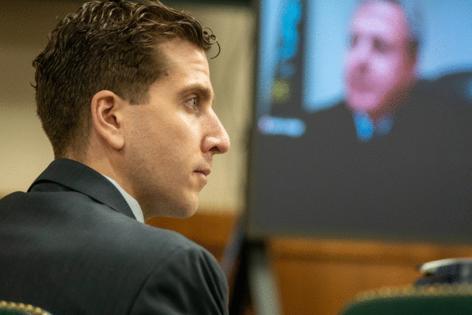Idaho murder suspect Bryan Kohberger expected to plead guilty. What to know
Published in News & Features
BOISE, Idaho — Bryan Kohberger, the murder suspect in the fatal stabbings of four University of Idaho students, is expected to plead guilty Wednesday after he accepted a plea deal, which would end the high-profile criminal case months earlier than anticipated.
The 30-year-old is scheduled for an 11 a.m. plea hearing at the Ada County Courthouse, where it’s “expected” he’ll plead guilty to all five of the felony counts against him in exchange for the removal of the death penalty, according to a letter the prosecution sent to victims’ families. If he doesn’t, the trial will proceed as planned next month.
The looming trial was expected to begin Aug. 4 at the Ada County Courthouse and was slated to last three months, with dozens of witnesses testifying to the investigation that spanned several states and narrowed in on Kohberger as the suspect.
He was arrested in December 2022 at his parents’ house in Pennsylvania and promptly extradited back to Idaho, where he faced four counts of first-degree murder and felony burglary.
It’s been 2 1/2 years since that arrest. Here’s what to know about the criminal case.
What happened?
Shortly before noon Pacific time on Sunday, Nov. 13, 2022, Moscow police officers responded to a 911 call about an unconscious person at a house near the University of Idaho campus.
They walked into the home on King Road and found the bodies of four victims. According to the coroner report, the students had been stabbed to death in the early morning hours with a large, fixed-blade knife.
Who is Kohberger?
Kohberger grew up in Pennsylvania and had moved to Pullman, Washington, in the summer of 2022 to attend Washington State University’s doctoral program in criminal justice and criminology.
He was remembered as an awkward and fairly reserved teen who struggled with a substance abuse disorder and had taken an interest in law enforcement at a young age.
Who are the victims?
Three of the victims were roommates living in the off-campus King Road home: U of I seniors Madison Mogen, 21, of Coeur d’Alene; Kaylee Goncalves, 21, of Rathdrum; and junior Xana Kernodle, 20, of Post Falls.
Freshman Ethan Chapin, 20, of Mount Vernon, Washington, was Kernodle’s boyfriend and stayed over for the night.
Two other female roommates went unharmed in the attack.
How did they land on Kohberger as the suspect?
After nearly a seven-week manhunt, Kohberger, a graduate student at Washington State University in Pullman, Washington, was taken into custody on Dec. 30, 2022, at his parents’ home in eastern Pennsylvania.
Investigators used DNA they discovered from a knife sheath left at the scene of the crime, and sent it to Idaho State Laboratory, according to a probable cause affidavit. Law enforcement matched it to DNA they had found from trash outside the home of Kohberger’s parents in Pennsylvania, where Kohberger was arrested.
Investigators in the affidavit wrote that results identified a male and were able to exclude “at least 99.9998% of the male population” based on those results. They used a technique known as investigative genetic genealogy, or IGG, which uses popular ancestry websites, to build a family tree and hone in on Kohberger as the suspect, according to court records previously reported by the Idaho Statesman.
What were the charges?
Kohberger was charged with four counts of first-degree murder and a felony burglary charge in the killing of the four U of I students. Prosecutors had planned to seek the death penalty if Kohberger was convicted of murder.
What was the evidence against Kohberger?
Detectives found a Ka-Bar brand leather knife sheath next to one of the victims at the crime scene and discovered DNA — later matched to Kohberger — on the button snap, according to a probable cause affidavit.
Records later disclosed by the prosecution also alleged that Kohberger ordered a Ka-bar knife with sheath and a sharpener from Amazon. Other evidence includes cellphone records and testimony from one of the surviving roommates, who described the man who broke into their home to have “bushy eyebrows.”
Why did the defense want a plea deal?
For months, Kohberger’s attorneys tried — and failed — to get the death penalty off the table. The plea deal removes capital punishment as a sentencing option for Kohberger.
Edwina Elcox, a criminal defense attorney and former Boise prosecutor, previously told the Statesman that the possibility of capital punishment, and the reliance on the jurors, “are dice I would not want to roll with a client.” Removing the possibility of capital punishment is ultimately a “victory” for the defense, she told the Statesman.
_____
©2025 Idaho Statesman. Visit at idahostatesman.com. Distributed by Tribune Content Agency, LLC.







Comments